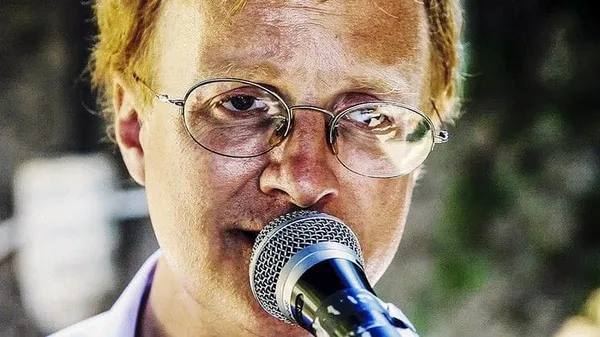Eye For Film >> Movies >> Mateo (2014) Film Review
Mateo
Reviewed by: Jennie Kermode

What do you picture when you hear the word mariachi? The chances are it's not a 50-year-old skinny white guy with ginger hair. Mateo, sometimes known as Matthew Stoneman, is one of those people who clearly embarked on life's journey convinced that he could be whatever he wanted - even if what he wanted was to be a socially awkward ex-con scraping a living as an entertainer and spending all his spare cash on sex workers.
For a brief period in the Nineties, Stoneman was a minor celebrity in Los Angeles, the proprietor of an underground hip-hop studio. Like many creative artists, he struggled to make ends meet; unlike most, he chose to solve this by committing armed robbery. Unfortunately for him, thing don't tend pan out for documentary stars the way they do for action movie heroes, and a daring jump off the side of the freeway during his escape resulted in two broken ankles and a four-and-a-half-year prison term. It was the best thing that ever happened to him.

All this we learn about as history, explained by Stoneman himself or by his many friends in Cuba, where he now spends most of his time. It was in prison that he learned to speak Spanish and discovered a talent for marachi songs. Encouraged by fellow inmates who enjoyed his concerts, he became convinced that this was his true calling. Something about Stoneman suggests he had probably been convinced of several other true callings beforehand. This time, though, the groove stuck, and he started slipping away to Latin America whenever he could despite a court order restricting his movements.
He speaks passionately of his hatred for Los Angeles, implying a broader rejection of the land of his birth. He loves Buena Vista Social Club, the easy going spirit of the tropics (where, in fact, everybody else seems to be working harder than he is), and the women. He wants to live like Ernest Hemingway. "Do you know who Ernest Hemingway is?" he asks a Cuban friend. No, she doesn't. He died. He was dying for a long time, Stoneman explains.
Despite Stoneman's intense self-belief, there's nothing particularly extraordinary about his music, but in many ways this makes the film more interesting. It can't coast by on gorgeous tunes; it focuses on gritty details. Stoneman seems entirely comfortable with this. He's interesting without being charismatic, intriguing without being brilliant or charming; he's unusually honest. When singing, he has a voice that hints a a wealth of emotion we never see evinced in his day to day life. Everything is about the music, he says, and it resembles his remark on Hemingway; everything has at some point been calculated for effect; his honesty stems from the fact that he has chosen to live his performance, to believe sincerely in the artificial life he has created. His Cuban friends seem to love him, seem amused by him, care for him as if he were an exotic pet. The one who jokes that she is his mother is determined to find him the right girl so that he'll settle down, but settling down is palpably not part of his plan.
A deceptively incisive portrait of a man living life on what he thinks ought to be his own terms, Mateo makes for easy listening and consciously troubling viewing.
Reviewed on: 21 Aug 2015

















